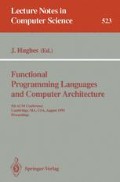Abstract
Objects with dynamic types allow the integration of operations that essentially require run-time type-checking into statically-typed languages. This paper presents two extensions of the ML language with dynamics, based on what has been done in the CAML implementation of ML, and discusses their usefulness. The main novelty of this work is the combination of dynamics with polymorphism.
Preview
Unable to display preview. Download preview PDF.
References
Martín Abadi, Luca Cardelli, Benjamin Pierce, and Gordon Plotkin. Dynamic typing in a statically-typed language. In Proc. Symp. Principles of Programming Languages, 1989.
Martín Abadi, Luca Cardelli, Benjamin Pierce, and Gordon Plotkin. Dynamic typing in a statically-typed language. Research report 47, DEC Systems Research Center, 1989. Extended version of [1].
Andrew Appel. Run-time tags aren't necessary. Lisp and Symbolic Computation, 2(2):153–162, June 1989.
Luca Cardelli. Amber. In Combinators and Functional Programming Languages, volume 242 of Lecture Notes in Computer Science. Springer-Verlag, 1986.
Luis Damas and Robin Milner. Principal type-schemas for functional programs. In Proc. Symp. Principles of Programming Languages, 1982.
Benjamin Goldberg. Tag-free garbage collection for strongly typed programming languages. In SIGPLAN conference on Programming Language Design and Implementation, 1991.
Michael Gordon. Adding eval to ML. Privately circulated note, circa 1980.
Gérard Huet. The Calculus of Constructions, documentation and user's guide. Technical report 110, INRIA, 1989.
David Maier and David S. Warren. Computing with logic: logic programming with Prolog. Benjamin/Cummings, 1988.
Dale Miller. Lexical scoping as universal quantification. In Proceedings of the sixth international conference for logic programming, 1989.
Dale Miller. Unification under a mixed prefix. Draft, 1990.
Robin Milner, Mads Tofte, and Robert Harper. The definition of Standard ML. The MIT Press, 1990.
Alan Mycroft. Dynamic types in ML. Draft, 1983.
Simon Peyton-Jones. The implementation of functional programming languages. Prentice-Hall, 1987.
François Rouaix. Safe run-time overloading. In Proc. Symp. Principles of Programming Languages, 1990.
Philip Wadler and Stephen Blott. How to make ad-hoc polymorphism less ad-hoc. In Proc. Symp. Principles of Programming Languages, 1989.
David H.D. Warren. An abstract Prolog instruction set. Technical note 309, SRI International, 1983.
Pierre Weis. The CAML reference manual, version 2.6.1. Technical report 121, INRIA, 1990.
Author information
Authors and Affiliations
Editor information
Rights and permissions
Copyright information
© 1991 Springer-Verlag Berlin Heidelberg
About this paper
Cite this paper
Leroy, X., Mauny, M. (1991). Dynamics in ML. In: Hughes, J. (eds) Functional Programming Languages and Computer Architecture. FPCA 1991. Lecture Notes in Computer Science, vol 523. Springer, Berlin, Heidelberg. https://doi.org/10.1007/3540543961_20
Download citation
DOI: https://doi.org/10.1007/3540543961_20
Published:
Publisher Name: Springer, Berlin, Heidelberg
Print ISBN: 978-3-540-54396-1
Online ISBN: 978-3-540-47599-6
eBook Packages: Springer Book Archive

